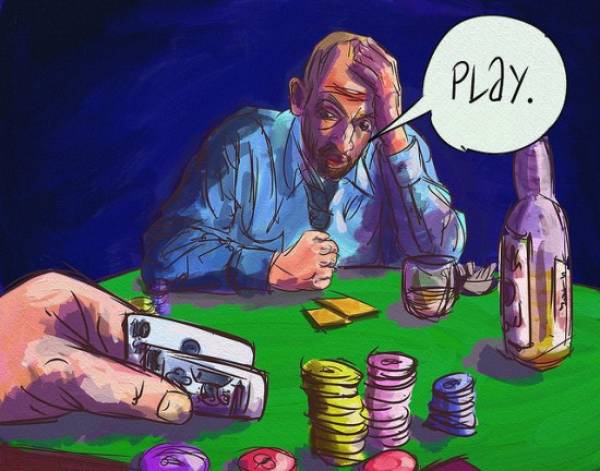What Happens When Mom and Dad Have a Gambling Addiction

(Reuters) - Donna Zaharevitz began gambling after a birthday visit in her late 40s to the Mohegan Sun casino in Uncasville, Connecticut.
Lonely, with four children in college and her husband busy with a demanding job, Zaharevitz soon returned.
"I had been a caregiver, but all of the sudden, there was nobody to care for," Zaharevitz says.
She spiraled out of control in her early 50s, losing more than $200,000, decimating her family's savings and her retirement funds. Her husband divorced her, and one of her four kids still doesn't talk to her.
While it sounds extreme, Zaharevitz's experience isn't entirely uncommon, particularly among women. Two percent of older Americans are pathological gamblers, 4 percent are problem gamblers and 17 percent are at risk, according to research by the Council on Compulsive Gambling of New Jersey and Fairleigh-Dickinson University.
Calls from seniors to the council's hotline have gone up by 13 percent to 16 percent since the 2006 study was done, says Jeffrey Beck, the council's assistant director for clinical services, treatment and research.
"Whenever I give a talk to senior citizens, I always tell them that one out of four of you have a problem with gambling - who is it?" Beck says.
In January, problem gambling became classified as an impulse control disorder by the American Psychiatric Association.
Here are some ways to detect and help treat a gambling addiction:
1. Look for changes in activity and behavior
Overall, about 4 percent of the U.S. population is either a problem or pathological gambler. Those with a family history of alcohol, drug or gambling problems are at greatest risk. Someone who is in recovery for another addiction is especially vulnerable to compulsive gambling, experts say.
Among the signs that something is amiss: Parents don't seem as available as they once were, or they are borrowing money from you or saying that they can't afford to go out to dinner.
A change in behavior is another red flag, such as when a parent no longer has an interest in a previously enjoyable pursuit.
2. Identify the real problem
Seniors, many of whom are on fixed incomes, may relish the idea of getting rich quick, but there's usually a bigger issue, says Thomas Broffman, an assistant professor of sociology at Eastern Connecticut State University who has worked extensively with problem gamblers.
"Gambling, for some seniors, feels like something that they can do that they have control over," Broffman says.
Problem gambling often starts soon after a life transition, like the death of a spouse or retirement, Broffman says. Experts say women are more susceptible to gambling problems than men beause they use games of chance as a means of escape from bigger personal problems.
Lori Rugle, director of Problem Gambling Services in Middletown, Connecticut, had an elderly client in southwestern Connecticut whose gambling addiction was uncovered after her children discovered stacks of unpaid bills and an empty refrigerator and cupboards. Their mother was going to a convenience store, playing lottery scratch-off tickets. But she wasn't greedy, just lonely.
"She loved chatting with the clerks, who would offer her a chair to sit down in," Rugle says. The woman's children took over paying the bills and gave her a $50 monthly allowance to for lottery tickets.
3. Clean up the mess
It's important to catch the problem early because without anyone paying attention, life savings can go quickly, especially if a person's memory or judgment is impaired.
Martha Patterson, a certified elder-law attorney in Burbank, California, says she had a family come to her because their blackjack-playing father was losing thousands of dollars every time he played. After a weekend in which he lost $30,000, she helped the family prove in court that his judgment was impaired and that he should have a limit imposed on his gambling.
Once a casino has your parent's money, you aren't getting it back. Focus on the future, say addiction experts.
It can be difficult to tell parents that they aren't spending their money wisely. They rightfully feel that they've worked hard, and they may use that as a defense.
"You have to lovingly tell your parent that you care, you're concerned, and that it's not about the money," says Rugle, adding that while you shouldn't judge them, you may want to suggest that you start managing their bills.
A good place to find help is the National Council on Problem Gambling, with chapters in 35 states (or the hotline 1-800-522-4700).
Luck turned for Zaharevitz, a resident of Windsor Locks, Connecticut. She was young enough to rebound from her crisis. Now 70, she hasn't placed a bet in 16 years and works to rehabilitate problem gamblers.
4. Addiction vs. entertainment
It's important to recognize that some forms of gambling can be more addictive than others. "It may be your mother can play bingo at the church but can't do the casino," Rugle says. "Or maybe she can't do bingo, but she can play the lottery." Her advice: Work with a professional who understands those dynamics.
Zaharevitz says she spoke to some siblings who were concerned about their mother. She was going to the casino once or twice a month. The woman never spent more than $200 in a month and could afford to lose it. Zaharevitz felt that the woman, at 85, was entitled to the benefit of the doubt.
"In this case," Zaharevitz says, "she didn't have an issue. Her family had the issue."













